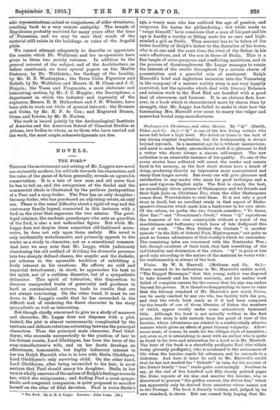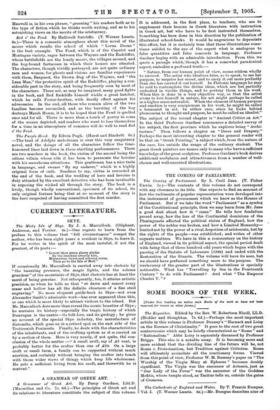NOVELS.
THE FORD.*
THOUGH the environment and setting of Mr. Legge's new novel are eminently modern, his attitude towards his characters, and the rules of the game of fiction generally, reveals an agreeable conservatism. It is a tale of new men and old acres that he has to tell us, and the antagonism of the feudal and the commercial ideals is illustrated by the perilous juxtaposition of a Peer and a soap-boiler. The Peer has an only daughter ; the soap-boiler, who has purchased an adjoining estate, an only son. There is the usual difficulty about a right-of-way and the customary family legend, connected in this instance with a ford on the river that separates the two estates. The privi- leged retainer, the sardonic gamekeeper who acts as guardian of the ford, is also a not unfamiliar figure. But while Mr. Legge does not despise these somewhat old-fashioned acces- sofies, he does not rely upon them unduly. His novel is only incidentally melodramatic, and primarily appeals to the reader as a study in character, not as a sensational romance. And here we may note that Mr. Legge, while judiciously abandoning the old method of dividing his dramatis personae into two sharply defined classes, the angelic and the diabolic, yet adheres to the agreeable tradition of exhibiting a lively interest in his creations. He affects no cold and impartial detachment; in short, he approaches his task in the spirit, not of a, ruthless dissector, but of a sympathetic delineator. This spirit of toleration, this disposition to discover unexpected traits of generosity and goodness in hard or contaminated natures, leads to results that are not always convincing. On the other hand, it must be set down to Mr. Legge's credit that he has succeeded in the difficult task of rendering the finest character in the story sympathetic as well as interesting.
But though chiefly concerned to give us a study of manners and character, Mr. Legge does not dispense with a plot. Indeed, the plot is almost unnecessarily complicated by the intricate and delicate relations subsisting between the principal characters. Thus the principal male character, Paul Gled- dayne, who succeeds unexpectedly to the position of heir to his 'distant cousin, Lord Gleddayne, has been the lover of the soap-manufacturer's wife, and on her death develops an affectionate, honourable, but highly indiscreet interest in her son Ralph Harrold, who is in love with Stella Gleddayne, Lord Gleddayne's only surviving child. On the other hand, Lord Gleddayne, after being reconciled to his, heir, is most anxious that Paul should marry his daughter. Stella in her turn is wholly unaware of the nature of Ralph's feelings towards her, which she reciprocates ; and finding Paul a most sympa- thetic and congenial companion, is quite prepared to sacrifice herself on the altar.of filial devotion. Paul is twice Stella's
* The Ford. By A. E. J. Legge. London ; John Lane. [68.]
age, a weary man who has outlived the age of passion, and outgrown his tastes for philandering ; but while ready to "range himself," he is conscious that a man of his past and his age is hardly a worthy or fitting mate for so rare and high- minded a girl as Stella. Then account has to be taken of the bitter hostility of Ralph's father to the disturber of his home, who is at one and the same time the rival of the father in his son's affections, and of the son in those of Stella. This is a fine tangle of cross-ptuposes and conflicting ambitions, and in the process of disentanglement Mr. Legge manages to retain the interest of the reader throughout by a certain charm of presentation and a graceful vein of sentiment. Ralph Harrold's brief and inglorious incursion into the Venusberg in the company of a mature society siren is not very happily contrived, but the episodes which deal with literary Bohemia and mission work in the East End are handled with a good deal of cleverness and humour. It is an obvious flaw, how- ever, in a book which is characterised more by charm than by strength, that Mr. Legge has failed to make it clear how the fascinating Mrs. Harrold ever came to marry the vulgar and somewhat brutal soap-manufacturer.
Shakespeare's Christmas, and other Stories. By "Q." (Smith, Elder, and Co. 6s.)—" Q" is one of the few living writers who never fall below a high level. His defect at times is the lack of any strong original inspiration, but his workmanship is always beyond reproach. In a mannered age he is without mannerisms, and amid so much hasty, unconsidered work it is pleasant to find a writer who shows always a sincere self-respect. The new collection is an admirable instance of his quality. No one of the seven stories here collected will arrest the reader and remain fixed in his memory, as the best short stories have a knack of doing, producing thereby an impression more concentrated and sharp than longer novels. But every one will give pleasure and satisfaction to any reader who cares for good technique and a pure and vigorous English style. The first is clearly the best, an exceedingly clever picture of Shakespeare and his friends and their high jinks on Christmas Eve, when the elder Shakespeare comes from Warwickshire to visit them. It is not only a good story in itself, but an excellent study in that aspect of Shake- speare's character which made him a landowner in his own shire. Of the others, we prefer the two Cornish comedies, "Ye Sexes, Give Ear!" and "Frenchman's Creek," where "Q" reproduces the humours of his own countryside without a touch of the mawkishness and buffoonery which have of late disfigured this class of work. "The Man Behind the Curtain" is another episode "in the Life of Gabriel Foot, Highwayman," not quite so good as former adventures of that worthy's which we remember. The remaining tales are concerned with the Peninsular War ; but, though excellent of their kind, they lack something of the individuality and distinction of the others. "Q" is good or less good only according to the nature of the material he works with : his craftsmanship is always of the best.
Vivien. By W. B. Maxwell. (Methuen and Co. Os.)— There seemed to be indications in Mr. Maxwell's earlier novel, "The Ragged Messenger," that this young author was disposed to take himself and his talent seriously, and his earlier work failed of complete success for the reason that his aim was rather beyond his powers. It is therefore disappointing to have to state that the literary standard of Mr. Maxwell's new novel, Vivien, can be easily reached by any one who has facility with his pen, and that the whole book reads as if it had been composed for the benefit of one of those libraries of fiction the numbers of which appear weekly under some attractively hymeneal title. Although the book is not actually written in the first person, the story is told entirely from the point of view of the heroine, whose adventures are related in a confidentially allusive manner which gives an effect of great literary vulgarity. Allow- ances must, of course, be made for the oblique style of narrative ; yet, even so, it is astonishing to meet with an author who is quite as frank in his love and admiration for a Lord as is Mr. Maxwell. The hero of the book is a cheerfully profligate Earl (the villain being gloomily profligate), who is awakened to 'the seriousness of life when the heroine repels his advances, and be succeeds to a dukedom. And hero it must be said to Mr. Maxwell's credit that he has not studied his " Debrett " in vain, for his account of the Duke's family " tree " reads quite convincingly. Needless to say, at the end of five hundred and fifty closely printed pages the Duke repents of his sins and marries the heroine, who is discovered to possess "the golden current, the divine fire," which can apparently only be derived from ancestors whose names ale in the Peerage. The book is fluently written, and, judged by its own standard, is clever. But one cannot help hoping that Mr.
Maxwell is, in his own phrase, " greening " his readers both as to the type of fiction which he thinks worth writing, and as to his astonishing views on the merits of the aristocracy.
Red o' the Feud. By Halliwell Sutcliffe. (T. Werner Laurie. 6s.)—There is a romantic atmosphere about this novel of the moors which recalls the school of which "Lorna Doone " is the best example. The Fend; which is of the Capulet and Montague variety, rages between the Waynes and the Radcliffes, whose battlefields are the lonely moors, the villages around, and the bog-bound fastnesses in which their houses are situated. The characters, though vividly portrayed, are not quite ordinary men and women, for ghosts and visions are familiar experiences with them, Barguest, the Brown Dog of' the Waynes, and "the Lean Man," the protective spirit of the Radcliffes, playing a con- siderable part in the story, and being frequently seen by most of the characters. There are, as may be imagined, many good fights in the book, and Red Radcliffe himself wields a great hatchet, which he calls Foster-brother, with deadly effect against his adversaries. In the end, all those who remain alive of the two families become reconciled, and as the bursting of the bog destroys Marsh House, it is to be hoped that the Feud is quelled once and for all. There is more than a touch of poetry in some of the scenes depicted, and readers who want to lose themselves for a time in an atmosphere of romance will do well to read Red o' the Feud.
The Purple Head. By Edwin Pugh. (Hurst and Blackett. 6s.) —The trail of Adelphi melodrama is over this very sanguinary novel, and the doings of all the characters follow the time- honoured lines laid down in these startling performances. There are two murders in the book, the victim of the second being the odious villain whose role it has been to persecute the heroine with his unwelcome attentions. This gentleman has a nice taste in language, and swears "By my cadaver," which is a highly original form of oath. Needless to say, virtue is rewarded at the end of the book, and the wedding of hero and heroine is duly attended by the excellent detective who has been invaluable in exposing the wicked all through the story. The book is a lively, though wholly conventional, specimen of its school, its only original feature being that at no moment of the story is the hero suspected of having committed the first murder.



































 Previous page
Previous page